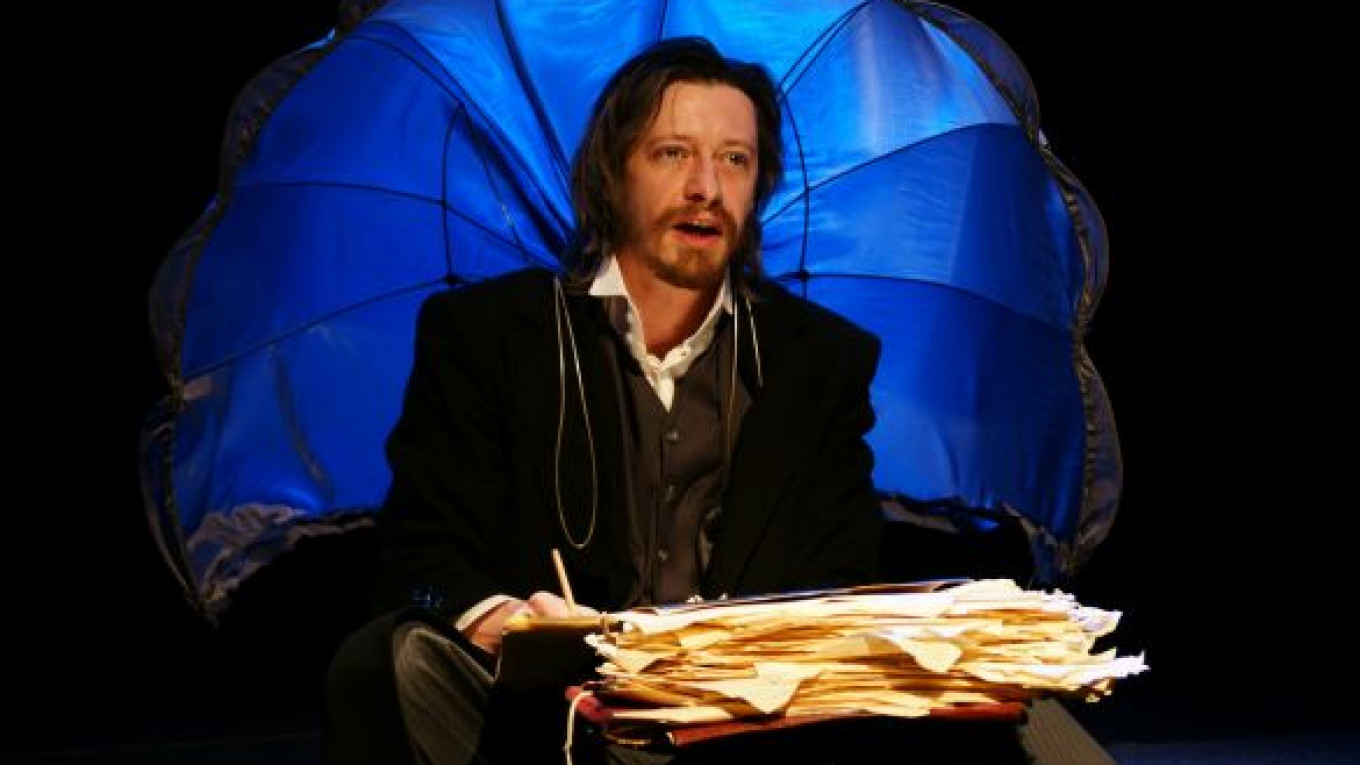I wonder whether there is anything messier than the inner workings of a Russian theater. The intrigues, the backbiting, the animosities, the hostilities, the egos, the — well, you get the message.
And yet, who would turn down a chance to become a part of this glorious world where everything that is make-believe is more important than life itself?
Perhaps that is what Mikhail Bulgakov was thinking when he wrote "Theatrical Novel," also known in English as "Black Snow." At least, those were the thoughts I had after attending a dramatization of the novel at the Fomenko Studio.
Pyotr Fomenko and his leading actor Kirill Pirogov are listed as "authors" of the production, which I suspect means they shared duties directing and creating the performance text. Vladimir Maximov imagined the setting, a combination of performance on two levels with the stage split in two by a long corridor down the middle. From time to time a cubicle jutting into the first rows of seats allows actors close access to the spectators. On this stage Pirogov is almost always the center of attention as Sergei Maksudov, the seemingly hapless author of a play that is to be staged at a major Moscow theater.
Bulgakov wrote his novel after suffering what he perceived to be horrible indignities at the hands of the famed Konstantin Stanislavsky at the Moscow Art Theater in the 1920s. In his roman a clef Bulgakov settled scores with just about everyone, creating wicked caricatures of Stanislavsky, actors old and young, directors good and bad, secretaries and sundry employees at a house called the Independent Theater. And yet a dramatization of Bulgakov's novel "The White Guard" at the Moscow Art Theater is what solidified the writer's fame before he reached cult status with "The Master and Margarita."
Stanislavsky, known here as Ivan Vasilyevich, is played with comical pomp and ceremony by Maxim Litovchenko. Ivan Vasilyevich's nemesis, if you will, his partner in founding the Independent Theater, is referred to in the novel and the play at the Fomenko Studio as Aristarkh Platonovich, but there is no doubt that he represents the real-life Vladimir Nemirovich-Danchenko. Aristarkh, who hasn't spoken to Ivan Vasilyevich in years, never puts in an appearance. In his place the fervently devoted secretary Poliksena Toropetskaya tends to his affairs large and small.
Galina Tyunina's rigidly deadpan performance of Toropetskaya in the absence of her boss creates a hilarious portrait of the way respect and duty easily morph into megalomania in the theatrical hothouse. The world of "Theatrical Novel" is topsy-turvy. Its heroes and heroines are obnoxious and cunning. They may or may not have talent, but many have power and most everyone is a lusciously colorful character. It may be a madhouse, but it is fascinating.
Pirogov's Maksudov quietly makes his way through all the humiliations a writer can encounter. Fellow journalists at the magazine where he works mock him when he shows them his new novel. Even his publisher suspects no one will buy it. But all hell breaks loose when the Independent Theater commissions him to write a play based on it.
Split into two warring factions backing either Ivan Vasilyevich or Aristarkh Platonovich, everybody is either out to use Maksudov or to destroy him. The deeper he becomes involved in the theater's daily routine, the more he loses control over the only thing he values — the play he is adapting from his novel.
Bulgakov ran into his problems with the Art Theater when it was about 30 years old. The Fomenko Studio celebrates its own 20th anniversary next year. I know nothing about the inner workings of this theater, but I know enough about theaters in general to suspect that a few of the foibles Bulgakov poked fun at must be in evidence at the Fomenko Studio.
Perhaps that is why Fomenko and Pirogov made every effort to embrace Bulgakov's novel in full. Their dramatization features 50 characters played by approximately 35 actors.
It must be said there is danger in this. Things repeatedly bog down as new characters are introduced or old ones keep returning to hash out half-important old business. It is a lot to keep track of.
At times this production makes one think of an elaborate flying machine that, on paper, surely is a bit of genius. In fact, it only gets off the ground for brief moments at a time. Still, the wonderfully eccentric characters played by Litovchenko, Tyunina and Pirogov are a joy to watch.
"Theatrical Novel" (Teatralny Roman) plays at 7 p.m. Thurs., May 18 and 28, June 18 and 19 at the Pyotr Fomenko Studio, located at 29 Naberezhnaya Tarasa Shevchenko. Metro Kutuzovskaya. Tel. 249-1921. . Running time: 3 hours, 30 minutes.
A Message from The Moscow Times:
Dear readers,
We are facing unprecedented challenges. Russia's Prosecutor General's Office has designated The Moscow Times as an "undesirable" organization, criminalizing our work and putting our staff at risk of prosecution. This follows our earlier unjust labeling as a "foreign agent."
These actions are direct attempts to silence independent journalism in Russia. The authorities claim our work "discredits the decisions of the Russian leadership." We see things differently: we strive to provide accurate, unbiased reporting on Russia.
We, the journalists of The Moscow Times, refuse to be silenced. But to continue our work, we need your help.
Your support, no matter how small, makes a world of difference. If you can, please support us monthly starting from just $2. It's quick to set up, and every contribution makes a significant impact.
By supporting The Moscow Times, you're defending open, independent journalism in the face of repression. Thank you for standing with us.
Remind me later.







